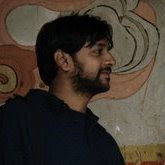
I saw Dharam, a film which has quite a sterling performance by Pankaj Kapur, who plays Pandit Chaturvedi, not to mention Supriya Pathak, who plays his wife.
Set in Varanasi, this film explores the mindset of the Hindu Brahmin, and the conflict that he faces in terms of accepting people from another community, specifically Muslims.
The story takes off with the priest accidentally touching a Dalit sweeper, on his way back from bathing in the Ganges, as a part of his morning ritual. This accidental touch results in the Dalit person getting beaten up by the onlookers, since he has defiled the priest. A rival priest, who happens to be there, says that even the shadow of a Dalit is not supposed to fall on a Brahmin.
The film then goes on to portray the priest's family life, which consists of an obedient wife, who is happy to accept everything which her husband says. He also has a daughter, who obeys his dictates, from education to not watching television! In the middle of all this, there is the beautiful young daughter of a patron, who falls in love with an American, Paul. She is supposed to be the embodiment of an Indian woman, who knows her status in society (which is nil without a husband) and quotes from the Manuskriti.
The film really takes off when an abandoned child is bought home by his daughter, and due to circumstances, the priest decides to adopt the boy, and this child becomes the son he never had. Again, it is problematic, because it presupposes that only the son can take the ideals of the priest to the next generation. And it is the wife who gives him this motivation!
Anyway, cut to eight years later, when they discover that the boy is actually Muslim. So the priest goes to great lengths to atone for his "sin", and performs various rituals for cleansing. However, he finds that he cannot get this child out of his mind, because of course, he has bonded closely with the child, and all the times he has spent teaching the boy, the rituals of a Brahmin, keep flashing in his mind.
Now the patron's son, hates the priest, because, he seemingly encourages the daughter, his sister to study, and therefore spoilt her, and encouraged the decline of culture in her. So he partners with the rival priest to remove Chaturvedi from the main priest post. In the meanwhile communal riots break out, and the child, who is now living with his real mother, comes to the priest seeking for safety, while the riots are going on. The priest and his family turn him away, only to repent. The climax is where the priest stops the mob, gives a speech about how Dharam or karma is about humanity and not duty of a particular caste. It is about accepting differences. The last shot is where the priest hugs the Muslim boy and walks away in to the sunset.
As an aesthetic exercise, the director gives us some wonderful footage of Varanasi, and there are some memorable shots of Chaturvedi bathing in the Ganges, with his students in the moonlight. However, as a film, which attempts to explore a serious issue of communal divide, I think it fails to do its job, and only asks more questions than it gives answers.
Firstly, the film is distinctly sexist in the way it portrays women characters, and the script itself relegates all the women to the sidelines. Worse, the film suggests that the role of women is just that of keeping, bearing children and sustaining the family. The girl who dared to marriage ends up being widowed, and says, it is tough to sacrifice love. Its an extremely puzzling attitude.
Secondly, the film takes on too much. The scene of Dalit Vs Brahmin is entirely wasted, and is not related to the Hindu Muslim issue at all. Even when the film explore the divide between the two religions, it dilutes the issue by playing up the internal politics in Varanasi where rivals are trying to usurp Chaturvedi from his post.
The most problematic thing in this film was the reasons given for the change of heart in the priest. He only intervenes when the child's life is at stake, and not for anything else. The film tries to simplify the whole issue, by trying to have us believe that when he says that our duty is humanity, the entire mob suddenly sees sense, and all are ashamed of their violent acts.
Throughout the film, he is made to look like a living saint, which is again very unrealistic.
All in all, its a commendable effort to make a film which differs from the run of the mill stuff. However, we must realize that sometimes, in our intentions to do good, we make things worse than they already are. Watch out for some good music, and some good vocals by Sonu Nigam.
The rest of the cast pretty much hams it throughout the film. 6/10

1 comment:
reviews cant be so lucid! i think dharam is a compromise between fact and fiction suggesting and attempting to harmonise deeper and complicated battles! its weird how they thought they solution was so simple! if it was then it would be a different world! some dreams are only dreams!
Post a Comment